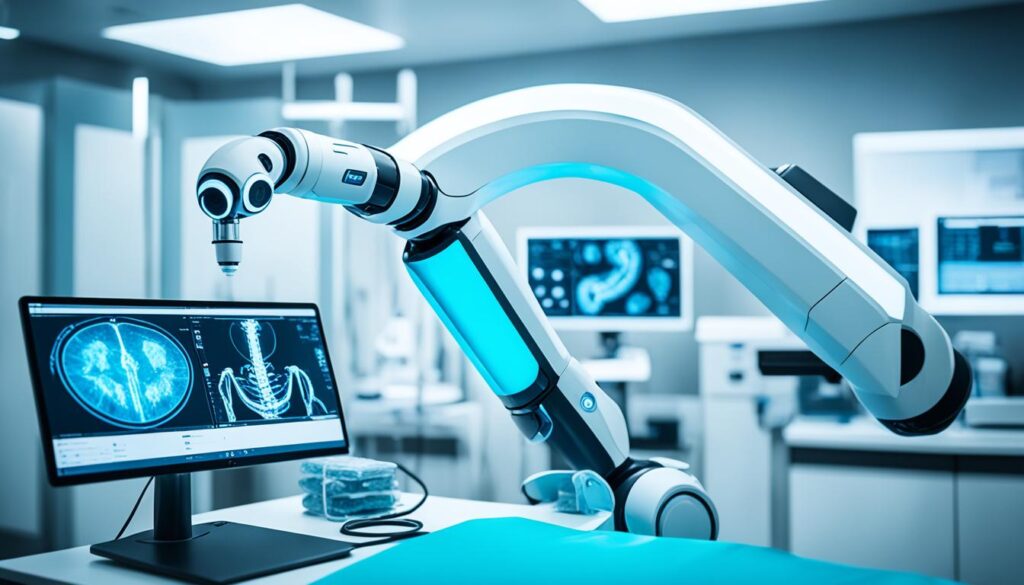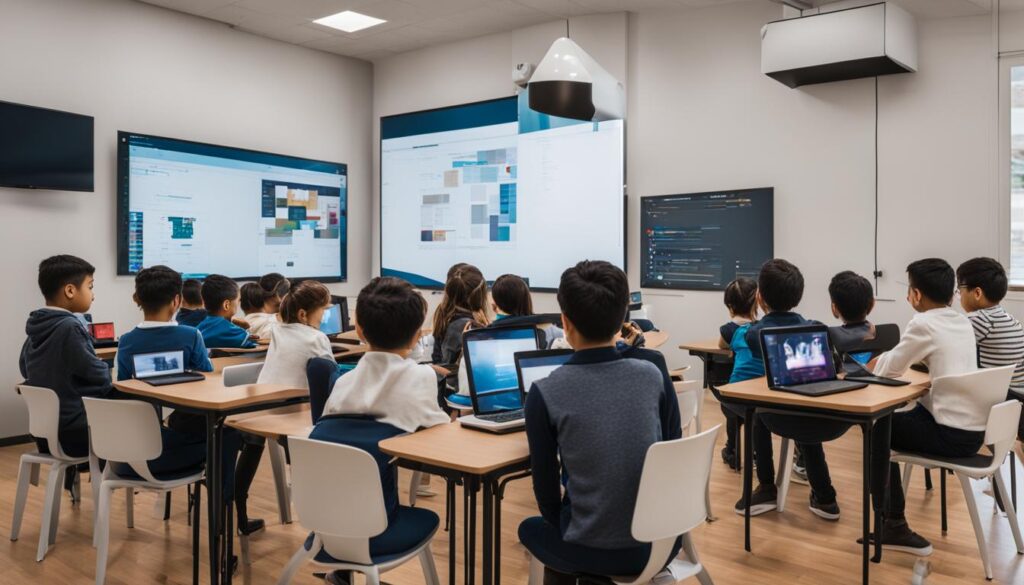Did you know that it is expected for artificial intelligence (AI) to contribute over $15 trillion to the global economy by 2030?
In the not-so-distant future, AI will transform every aspect of our lives, from the way we work and communicate to the healthcare we receive and the sustainability of our planet. As AI continues to advance at a rapid pace, it is crucial to understand the trends and insights surrounding this technology to navigate the transformative effects it will have on society.
Key Takeaways:
- AI is projected to contribute over $15 trillion to the global economy by 2030.
- AI will impact various sectors, including technology, jobs, healthcare, business strategies, cybersecurity, education, and sustainability.
- Personalized technology driven by AI can enhance relationships but also raises concerns about reduced human connection and privacy issues.
- Job automation powered by AI will reshape the workforce and job market, creating new opportunities but also displacing certain roles.
- In healthcare, AI is improving diagnostics, drug discovery, and patient care, but ethical considerations and biases in AI algorithms must be addressed.
AI and Personalized Technology
Artificial Intelligence (AI) is transforming the way we interact with technology, offering personalized experiences that cater to our individual needs and preferences. This has significant implications for our relationships, both in terms of how AI can help and how it can potentially hinder.
How Can AI Help Relationships?
AI has the potential to enhance relationships by providing personalized recommendations. Whether it’s suggesting the perfect restaurant for a date night or recommending a thoughtful gift, AI algorithms can analyze vast amounts of data to offer tailored suggestions that match our interests and desires. This personalization can help foster a stronger connection between individuals and improve the overall quality of their interactions.
Furthermore, AI can automate repetitive tasks, freeing up time and mental energy for more meaningful engagement. From scheduling reminders to managing household chores, AI-powered virtual assistants like Siri and Alexa can handle mundane tasks, allowing us to focus on building deeper connections with our loved ones.
The Impact of AI on Human Relationships
While AI offers many benefits, there are concerns about its potential impact on human relationships. Some worry that increased reliance on AI for communication may lead to a reduction in genuine human connection. As technology becomes more advanced, there is a risk that we may prioritize virtual interactions over face-to-face communication, compromising the depth and authenticity of our relationships.
“AI has the potential to enhance relationships by providing personalized recommendations. However, there are concerns about the impact of AI on human relationships, including the potential for reduced human connection and privacy issues.”
Privacy is another significant consideration when it comes to AI and relationships. As AI gathers and analyzes vast amounts of personal data, there is a potential for breaches of privacy that could compromise the trust and security within relationships. It is essential to address these concerns and ensure that AI technologies prioritize privacy and security measures.
| Advantages of AI in Relationships | Disadvantages of AI in Relationships |
|---|---|
| Personalized recommendations | Potential reduced human connection |
| Automated repetitive tasks | Privacy concerns |
| Improved communication |

In conclusion, AI has the potential to revolutionize relationships by offering personalized experiences, automating tasks, and improving communication. However, we must navigate the potential downsides, such as reduced human connection and privacy issues, to ensure that AI enhances rather than hinders our relationships.
AI and Job Automation
Job automation is a key aspect of how artificial intelligence (AI) will shape our lives in the future. AI-powered machines and algorithms have the potential to automate routine tasks, leading to significant changes in the workforce and job market.
AI has already impacted human relationships: it has transformed the way we work, communicate, and connect with each other.
When we reach Artificial General Intelligence (AGI), the point at which machines can perform any intellectual task that a human being can do, society will face unprecedented changes. AGI has the potential to revolutionize industries, economies, and the very fabric of our society.
While widespread AGI is not yet realized, experts and researchers are actively exploring the possibilities and implications. The timeline for AGI remains uncertain, with varying predictions of how far away we are from achieving it.
However, when AGI is reached, it will undoubtedly change society as we know it. AGI has the potential to automate complex tasks, augment human abilities, and revolutionize industries across the board.
While some speculate that AGI could be a threat to humanity, others believe that we can harness its power for the greater good. The impact of AGI on society deeply depends on how we shape its development and use it responsibly.
“AI will transform the workforce by eliminating some jobs, but it will also create new opportunities and enhance productivity.”
Job automation is a topic of concern when discussing AI’s future implications. It is important to recognize that while AI may replace certain jobs, it can also lead to the creation of new roles, allowing humans to focus on higher-level tasks that require creativity, critical thinking, and emotional intelligence.
The rise of AI in job automation calls for proactive measures to ensure a smooth transition in the workforce. This includes upskilling and reskilling programs, as well as fostering a culture of lifelong learning.
Ultimately, the impact of AI on job automation will depend on how we adapt, embrace innovation, and leverage AI’s potential to create a more efficient and inclusive society.

Key Takeaways:
- AI has the potential to automate routine tasks and reshape the job market.
- AGI, the point at which machines can perform any intellectual task, holds profound implications for society.
- The timeline for achieving AGI remains uncertain.
- AGI can automate complex tasks, augment human abilities, and revolutionize industries.
- Job automation will create both challenges and opportunities in the workforce.
- Upskilling and adapting to new roles will be crucial for navigating the future of work.
AI and Healthcare
Artificial intelligence (AI) is transforming the healthcare sector, revolutionizing how we approach diagnostics, drug discovery, and predictive analytics. With AI-powered technologies, we can enhance patient care, optimize treatment plans, and increase the efficiency of healthcare delivery. The advancements in AI have the potential to shape human life positively and improve the overall quality of healthcare.
One area where AI is making significant contributions is in diagnostics. AI algorithms can analyze vast amounts of medical data, including imaging scans, patient records, and genetic information, to assist healthcare professionals in accurate and early detection of diseases. This technology has the potential to not only save lives but also improve patient outcomes.
Furthermore, AI-powered solutions in the field of drug discovery are helping researchers identify potential new drugs and treatments more efficiently. By analyzing complex biological data and patterns, AI algorithms can identify promising drug candidates, speeding up the discovery process and reducing the time and cost involved in developing new drugs.

In addition to diagnostics and drug discovery, AI is also being used for predictive analytics, enabling healthcare providers to identify and address potential health risks proactively. By analyzing patient data, such as medical records, lifestyle factors, and genetic information, AI algorithms can generate insights and predictions about an individual’s health status, helping to prevent diseases and customize treatment plans.
While the advancements in AI hold immense promise for the healthcare sector, it is crucial to address concerns about ethical implications and potential biases in AI algorithms. AI systems must be designed and trained with diverse and representative datasets to avoid inadvertent biases that could impact patient care. Additionally, privacy and security safeguards must be implemented to protect sensitive patient information.
Key Benefits of AI in Healthcare:
- Enhancement of diagnostics and early disease detection
- Accelerated drug discovery and development
- Proactive identification of health risks through predictive analytics
- Improved patient outcomes and personalized treatment plans
With the ongoing advancements in AI technology, we can expect further breakthroughs in healthcare, empowering us to provide better and more efficient care for individuals worldwide. By harnessing the power of AI responsibly and ethically, we can leverage its potential to transform healthcare and improve human life.
AI and Business Strategies
As we look to the future, the impact of AI on businesses cannot be overstated. Companies across industries are increasingly incorporating AI into their strategies to gain a competitive edge and drive innovation. From improving customer service to optimizing supply chain logistics, AI offers numerous benefits for businesses of all sizes.
One of the key advantages of AI in business is its ability to enhance customer service. With AI-powered chatbots and virtual assistants, companies can provide instant support, personalized recommendations, and efficient responses to customer inquiries. This not only improves customer satisfaction but also frees up human resources to focus on more complex and strategic tasks.
AI also plays a critical role in optimizing supply chain logistics. Through advanced data analytics and machine learning algorithms, businesses can forecast demand, manage inventory more efficiently, and streamline their operations. The ability to make data-driven decisions based on real-time insights helps companies reduce costs, minimize waste, and deliver products and services more effectively.
“AI offers businesses actionable insights through advanced data analytics, enabling them to make more informed decisions and drive operational efficiency.”
In addition to customer service and supply chain optimization, AI enables businesses to leverage valuable data and gain actionable insights. By analyzing vast amounts of information, AI algorithms can identify patterns, trends, and correlations that humans may not be able to detect. These insights can inform strategic decision-making, improve forecasting accuracy, and drive overall business performance.
However, it’s important to acknowledge and address the potential challenges and ethical considerations associated with AI in business. There are ongoing debates about the impact of AI on jobs, with concerns over potential job displacement. Companies must prioritize responsible AI development, ensuring that humans are still at the center of decision-making and that AI technologies are used ethically and transparently.
Overall, the integration of AI into business strategies has the potential to revolutionize industries and drive growth. By harnessing the power of AI, businesses can achieve operational efficiency, improve customer experiences, and unlock new opportunities for innovation. It’s a transformative journey that requires careful consideration, adaptability, and a commitment to responsible AI practices.

AI and Cybersecurity
In today’s increasingly digital world, cybersecurity is of utmost importance. The rise of cyber threats poses significant risks to individuals, businesses, and governments alike. Fortunately, artificial intelligence (AI) has emerged as a powerful tool in strengthening cybersecurity defenses.
AI utilizes machine learning algorithms to detect and mitigate potential threats, ensuring the safety and protection of sensitive data. By analyzing vast amounts of information in real-time, AI can identify patterns and anomalies that human operators may overlook. This enables organizations to respond swiftly to potential attacks and minimize their impact.
Using AI in cybersecurity is like having a highly skilled security analyst working non-stop, continuously monitoring and analyzing network traffic for signs of malicious activity.
Moreover, AI can automate routine security measures, such as patch management and vulnerability scanning. This reduces the burden on human cybersecurity professionals, allowing them to focus on more complex tasks that require critical thinking and analysis.
However, as AI becomes more prevalent in the cybersecurity landscape, there is a need for responsible development and regulations. Privacy concerns must be addressed to ensure that AI technologies respect individual rights and protect personal information.
Additionally, there are potential risks associated with AI, such as adversarial attacks where AI systems themselves are targeted and manipulated. Safeguards and protocols must be in place to mitigate these risks and ensure the reliability and integrity of AI-driven cybersecurity systems.

As the digital landscape continues to evolve, AI will play an increasingly critical role in safeguarding our online environments. By leveraging the power of AI, we can enhance our cybersecurity defenses and counteract the ever-evolving threat landscape.
AI and Education
Artificial Intelligence (AI) is poised to have a transformative impact on education, revolutionizing the way we learn and acquire knowledge. With the help of AI-driven technologies, personalized learning experiences and adaptive curriculums can be tailored to individual students, catering to their unique needs and learning styles.
Intelligent tutors powered by AI algorithms can assist students in grasping complex concepts, providing real-time feedback and guidance. These virtual tutors offer personalized instruction, adapting to the pace and level of understanding of each learner. By leveraging AI, students can receive targeted support and efficiently progress through their educational journey.
| Artificial Intelligence Examples in Education | Benefits and Implications |
|---|---|
| Intelligent Virtual Assistants | – Enhance communication and engagement – Answer student queries in real-time |
| Smart Content Recommendation Systems | – Deliver personalized learning materials – Suggest relevant resources based on individual interests and abilities |
| Automated Grading Systems | – Expedite grading processes – Provide immediate feedback to students – Enable educators to focus on personalized instruction |
As AI becomes more integrated into education, there are challenges to address. Ensuring equitable access to AI-driven educational resources is crucial to avoid exacerbating educational inequalities. Additionally, it is essential to assess and mitigate potential biases in AI algorithms to ensure fair treatment and assessment of students.
The future implications of AI in education are promising. With the continued advancement of AI technologies, education can become more accessible, efficient, and engaging, enabling students to develop the skills needed in a rapidly changing world.

AI and Sustainability
Artificial intelligence (AI) advancements have the potential to bring about transformative effects on society, including its impact on sustainability. By harnessing AI technologies, businesses can contribute to more sustainable practices, optimizing energy consumption, reducing waste, and improving resource management. AI-powered algorithms can analyze large datasets and provide strategic insights that enable informed decisions to be made regarding environmental impact.
One key application of AI in promoting sustainability is in the optimization of energy consumption. AI algorithms can analyze energy usage patterns and identify opportunities for reducing energy wastage, leading to significant cost savings and environmental benefits. By implementing AI-powered systems in industries ranging from manufacturing to transportation, businesses can minimize their carbon footprint and contribute to a more sustainable future.
AI-powered systems can optimize energy consumption, reduce waste, and improve resource management, contributing to sustainable business practices.
Additionally, AI can play a crucial role in waste management. By combining sensor technologies and machine learning algorithms, waste sorting and recycling processes can be automated, increasing the efficiency of waste management systems. This not only reduces the amount of waste sent to landfills but also promotes the recycling of valuable materials, conserving natural resources and minimizing environmental harm.
Resource management is another area where AI can make a significant impact. AI-driven optimization algorithms can help businesses streamline their supply chains, reducing inefficiencies and waste. By maximizing the use of available resources and minimizing unnecessary transportation and storage, businesses can operate more sustainably and reduce their environmental footprint.
However, it is crucial to consider the ethical implications and potential risks associated with AI in sustainability efforts. Striking a balance between technological advancements and responsible use of AI is essential to prevent unintended negative consequences. AI algorithms must be designed and implemented in a way that aligns with sustainability goals, respects human rights, and avoids exacerbating existing social and environmental inequalities.
Promoting Sustainable Business Practices with AI
| Benefits of AI in Sustainability | Challenges and Considerations |
|---|---|
|
|
By embracing AI and sustainability hand in hand, we can create a future where technological advancements drive positive change, enabling businesses to operate in harmony with the environment while promoting social equity.

AI and Automation
AI automation has had a profound impact on various industries, revolutionizing the way we work and improving overall efficiency and productivity. By leveraging artificial intelligence, organizations can automate repetitive tasks, enabling human resources to focus on more strategic and creative endeavors.
This shift in the workforce is reshaping the future of jobs, presenting both challenges and opportunities. While the automation of certain tasks may lead to concerns about job displacement, it also opens up avenues for upskilling and adaptability. As AI takes over repetitive and mundane tasks, humans can develop new skills and specialize in areas that require unique cognitive abilities, emotional intelligence, and critical thinking.
With the rise of AI and automation, the future of work will rely on our ability to collaborate with intelligent machines, as well as our capacity to continuously learn and embrace change. It is essential for individuals and organizations to invest in lifelong learning and adapt to the evolving demands of the AI-driven economy.
The Impact of AI Automation
“Automation is not a singular force, but rather a collaborative process where humans and AI work together to achieve better outcomes.”
AI automation has already transformed numerous industries, leading to increased productivity and improved workflows. Here are some examples of AI advancements that have significantly impacted human life:
- Manufacturing: AI-powered robots perform repetitive and dangerous tasks in assembly lines, enhancing efficiency and ensuring worker safety.
- Customer Service: Chatbots powered by AI algorithms provide instant and personalized support, improving customer experiences.
- Transportation: Autonomous vehicles equipped with AI technologies are revolutionizing transportation by improving safety, optimizing routes, and reducing congestion.
- Healthcare: AI algorithms aid in the diagnosis of diseases, assist in surgical procedures, and analyze vast amounts of medical data to identify patterns and trends.
- Financial Services: AI algorithms power automated trading systems, fraud detection, and personalized financial advice, enhancing the accuracy and efficiency of financial operations.
As AI continues to evolve, it is crucial to strike a balance between automation and human involvement. By harnessing the power of AI and automation, we can create a future that combines the efficiency of machines with the creativity and ingenuity of humans.

Image: AI and automation have transformed industries across various sectors, including manufacturing, customer service, transportation, healthcare, and financial services.
AI Ethics and Regulation
As we witness the continuous advancement of AI, it becomes increasingly essential to address the ethical considerations and establish regulations that ensure responsible AI development and use. By implementing transparency, accountability, and alignment with societal values, we can mitigate potential risks and maximize the benefits of AI in our lives.
AGI, or Artificial General Intelligence, remains a topic of ongoing discussion. It raises questions about the real threat it poses and what it would mean for humanity. While AGI holds the promise of groundbreaking advancements, it also carries potential risks that need to be carefully managed and regulated.
As we contemplate the future implications of AI on society, we are faced with the question of how far away we are from AGI. While its development and realization may be uncertain, it remains critical to consider its potential impact on humanity and establish safeguards accordingly.
“The development and responsible regulation of AI will shape the extent to which we can harness its potential for positive impact.” – Elon Musk
Ethical AI development involves addressing issues such as bias, privacy, and accountability. By ensuring the transparency and fairness of AI algorithms, we can guard against bias and discrimination. Strong privacy protections and data governance frameworks are necessary to safeguard sensitive information and prevent unauthorized use.
Moreover, establishing clear regulations and safety standards in AI development is paramount. These measures can help minimize the risks associated with AI deployment and foster trust among end-users. By fostering collaboration between policymakers and industry leaders, we can create a regulatory framework that strikes a balance between innovation and safeguarding societal well-being.
Overall, as we contemplate the role of AI in shaping our future, it is essential to prioritize ethical considerations and establish regulations that ensure responsible and beneficial AI deployment. By doing so, we can leverage the transformative power of AI while safeguarding the welfare of humanity.
Key Points:
- Ethical considerations and regulations are necessary to ensure responsible AI development and use.
- Ongoing discussions revolve around the potential risks and benefits of AGI.
- Addressing bias, privacy, and accountability is crucial in ethical AI development.
- Clear regulations and safety standards are needed to minimize risks and foster trust.
- Collaboration between policymakers and industry leaders is essential in establishing a regulatory framework.
AI Ethics and Regulation Comparisons
| Considerations | Ethics | Regulations |
|---|---|---|
| Transparency | Ensuring AI algorithms are transparent to understand decision-making processes. | Establishing regulations that require transparency in AI systems and algorithms. |
| Bias | Mitigating bias in AI systems to prevent discrimination and ensure fairness. | Enforcing regulations that ensure AI systems are unbiased and free from discriminatory practices. |
| Privacy | Safeguarding personal data and respecting individuals’ privacy rights. | Establishing regulations to protect personal data and ensure compliance with privacy laws. |
| Accountability | Ensuring AI developers and users take responsibility for the actions and decisions of AI systems. | Implementing regulations that hold AI developers and users accountable for the consequences of AI system actions. |

Conclusion
As AI continues to advance, it is poised to have a significant impact on our daily lives, shaping the future across various sectors. While there are legitimate concerns and challenges to address, such as job displacement and ethical considerations, the transformative potential of AI offers numerous opportunities for innovation, efficiency, and an improved quality of life.
By embracing AI responsibly, we can harness its full potential. It is essential to focus on inclusivity, sustainability, and ethical practices. This means ensuring that AI advancements benefit society as a whole, with a particular emphasis on addressing the potential impact on future jobs. Upskilling and adaptability will be crucial to navigate the changing landscape of work in an AI-driven economy.
AI’s role in shaping the future is undeniable. It has the power to drive positive societal changes, improve healthcare outcomes, optimize business strategies, enhance education, strengthen cybersecurity, and contribute to overall sustainability efforts. However, it is imperative to strike a balance between technological progress and ethical considerations to mitigate any adverse effects on daily life and ensure a future that benefits everyone.
As we continue to explore the vast possibilities of AI, it is essential to approach its advancements with caution and a critical eye. By embracing AI as a tool for positive change and driving collective progress, we can navigate the future with confidence and unlock its transformative potential.
FAQ
What are the disadvantages of AI in relationships?
AI in relationships can lead to reduced human connection and privacy issues.
Can artificial intelligence be a threat to humanity?
While AI has the potential to bring numerous benefits, there are concerns about its potential risks and ethical implications.
How can AI help relationships?
AI can enhance relationships by providing personalized recommendations, automating repetitive tasks, and improving communication.
How will AI affect our lives in the future?
AI will have a profound impact on various aspects of society, from technology and jobs to education and healthcare.
What impact will artificial intelligence have on humanity?
AI will shape society, leading to transformative effects on various sectors and potentially changing the way we live and work.
How will AI affect job automation?
AI-powered machines and algorithms have the potential to automate routine tasks, which may lead to changes in the workforce and job market.
How can AI help in healthcare?
AI is being utilized to improve diagnostics, drug discovery, and predictive analytics, leading to enhanced patient care and increased efficiency in healthcare delivery.
How does AI impact business strategies?
AI can improve customer service, optimize supply chain logistics, and provide actionable insights through advanced data analytics, giving businesses a competitive edge.
What is the role of AI in cybersecurity?
AI plays an essential role in strengthening cybersecurity by detecting and mitigating potential threats, ensuring data safety and protection.
How can AI contribute to education?
AI can provide personalized learning experiences and adaptive curriculums, enhancing the learning process and making education more accessible and efficient.
How does AI impact sustainability?
AI can optimize energy consumption, reduce waste, and improve resource management, contributing to more sustainable business practices.
What are the ethical considerations in AI development?
Responsible AI development and regulations are necessary to address privacy concerns, potential biases, and ensure transparency, accountability, and alignment with societal values.









